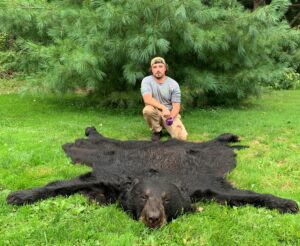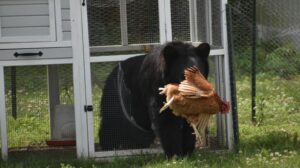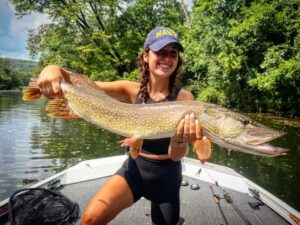According to MassWildlife, that is becoming the number one source of human-bear conflicts in Massachusetts. They and the Environmental Police receive calls daily about bears breaking into chicken coops. Almost every bear in Massachusetts has learned this behavior. As backyard chicken farming has increased in popularity across the Bay State, conflict with black bears has also greatly increased.
The state’s bear population is estimated at over 4,500 animals. Common in central and western Massachusetts, black bears are expanding their range east to the Route 495 corridor. Bears will spend time in areas where human-associated foods like poultry feed, garbage, compost, livestock, and beehives are easy to find. Bears will revisit the same areas repeatedly if food is readily available. As the bear range expands eastward toward the most densely populated communities of Massachusetts, bear sightings are increasing in these areas and residents, especially those who keep backyard chickens, should take steps to prevent conflicts with bears.
MassWildlife feels that coops and chicken wire provide inadequate protection from black bears. Properly maintained electric fencing is the only way to protect chickens or other poultry from bears. Electric fencing is easy to set up and safe around kids and pets. Failure to use electric fencing will likely result in loss of birds and coop damage.
Tips from MassWildlife
- Install electric fencing around coops to protect birds and coops regardless of flock numbers
- Keep open, mowed areas on all sides around chicken coops, beehives, and livestock pens. Do not set up chicken coop or hives in abandoned areas or close to overgrown vegetation. Bears will climb trees to get into adjacent coops and use the brush as cover when approaching.
- Do not place supplemental food nearby as a distraction. This can attract or habituate bears and is counterproductive.
- Contact local bear hunters to hunt your property. Contact a MassWildlife District Office or a local sportsmen’s club for help connecting with bear hunters.
- If you are (or anticipate) suffering property damage caused by a bear, contact the nearest MassWildlife District Office right away. MassWildlife biologists will provide you with advice that can lessen the problem.
Electric fencing tips
- Keep the power on at all times (minimum of 6,000 volts).
- Check and maintain chargers and batteries on a regular basis.
- Teach bears to avoid electric fences. Place bacon strips, foil strips with peanut butters, or honey on the hot wires to deliver a shock to the bear’s nose. A bear will remember the shock and associate the fence with pain.
- Remove vegetation on and near wires to prevent shorting out the fence.
- Review the Electric Fencing Guide to Prevent Bear Damage and contact your MassWildlife District Office for advice on electric fence.
Large black bear taken in Lee
As of last Tuesday, some 95 bears were checked in either online or at check stations statewide
One of those bears was a big one taken last Monday in Lee by Travis Bailey also of Lee. Based upon scales from Donovan’s Gravel in Lee, the boar weighed 620 lbs. field dressed (already gutted). After it was skinned out, it measured 7 feet from nose to tail, with a space between its ears of 10 inches.
It took one shot from his .50 caliber muzzleloader at about 12 yards to bring it down. It was dead almost instantly. The first person he called was his mentor Jay Rhind of Interlaken and then his father James Bailey. James called his neighbor Mike Ford and soon the three of them arrived to help get that bear out of the woods. Mike had an ATV with a winch. They had to use weight on the front of the quad and had to actually winch from tree to tree just to pull it out of the woods. The quad could barely drag it. Travis shot the bear at 6:00 pm and they didn’t get it out of the woods, a distance of about 100 yards, until almost 11:00 pm.
One of the reasons that he didn’t take the time to drive it somewhere to a certified scale was to make sure the meat was removed quickly due to the warm weather. Travis is incredibly respectful of animals and he hunts specifically for the food that is derived from them. The time it would have taken with the warm temperature outside to get it measured for some kind of State record was so much time that the meat would spoil and he felt that he couldn’t possibly in his heart and in his morals disrespect that animal by waiting any longer to start processing it for meat.
The picture was taken after the bear was skinned and meat removed. Travis is saving the pelt and head for making a large rug and the meat will be consumed. The skull is going to be removed and sent in to be measured for points. He believes the size of the skull will also confirm the size of the bear. The taxidermist, Justin Gladu, will be taking care of the requirements for the point system.
Travis never hunted for bear before and it was his first time out. He said he has been given such great guidance by the “tribe” of hunters locally and the people who contacted him through this experience. “They were so supportive, they told me all the right things to do and all the things not to do”. “It’s good to know that I have that support and it is just so great”.
A bonus pike
Rachel Kanter of Lenox had recently graduated from college and was getting ready to start her first job in New York City. She was raised in the Berkshires and requested a fishing trip before the summer was over. Her dad, Herb Kanter, had heard great things about Spencer Cookson at Berkshire Bass in Sheffield, and booked an outing.
According to Herb, from start to finish Spencer gave them a great experience and he can’t say enough about him. He took them out on the Housatonic River and was working nonstop to get them into fish. They had plenty of action catching large and smallmouth bass.
They were about to call it a day when Rachel hooked into a monster 35-inch pike. Herb’s not sure who was happier, Rachel, him or their guide.
Herb has lived in the Berkshires for 34 years and usually flyfishes the streams for trout. He had no idea the Housatonic held fish like this. “The time on the water with my daughter was priceless”, he said “and that pike was quite a bonus.”
According to Cookson, Rachel caught the pike on a War Eagle Spinnerbait and played it well. Because they weren’t using steel leaders, only 8 lbs. test braided line, the fear was there that the fish would cut the line with its sharp teeth or gill plates. But it didn’t.
After taking the picture, the fish was harmlessly released to fight another day.
Cookson owns and operates Berkshire Bass, a well- stocked fishing equipment store in addition to the guide service at 105 Main Street Sheffield.


